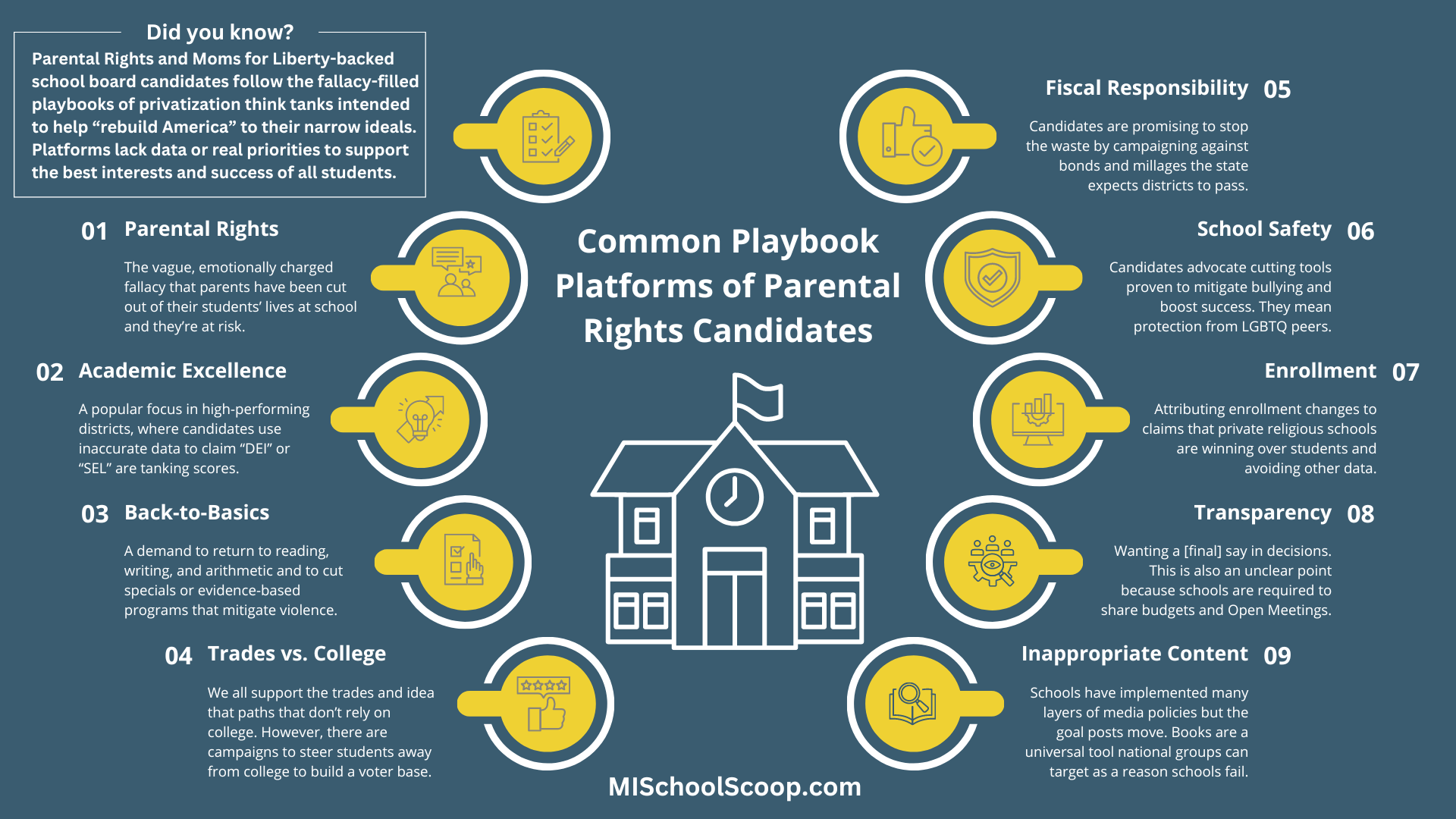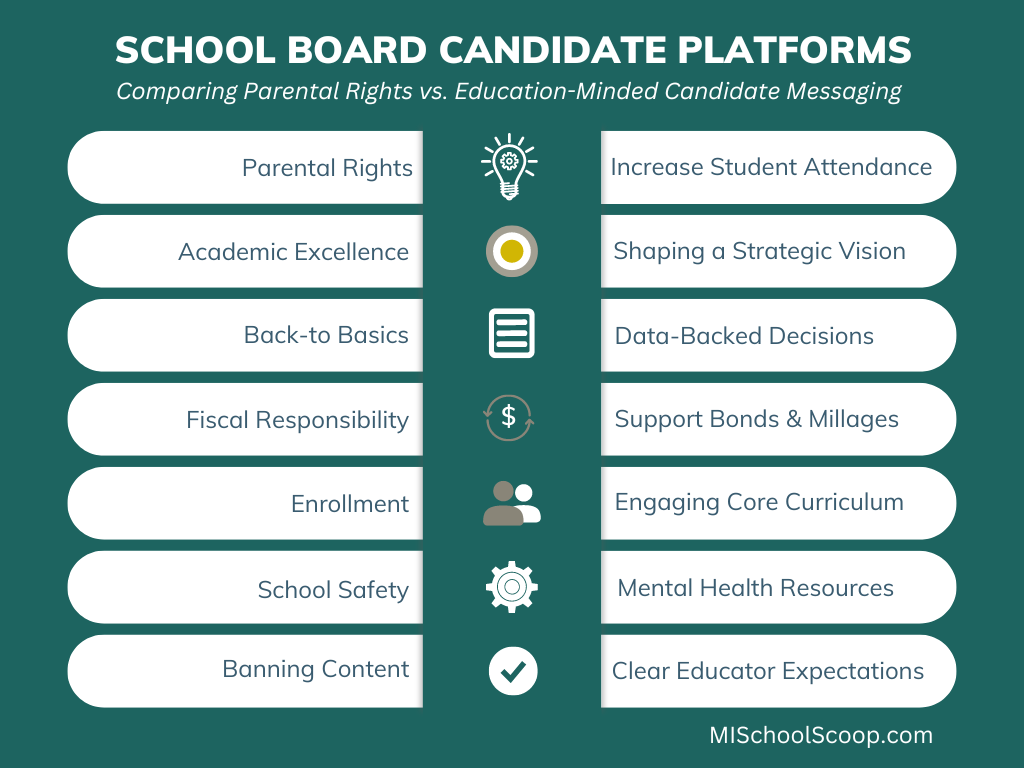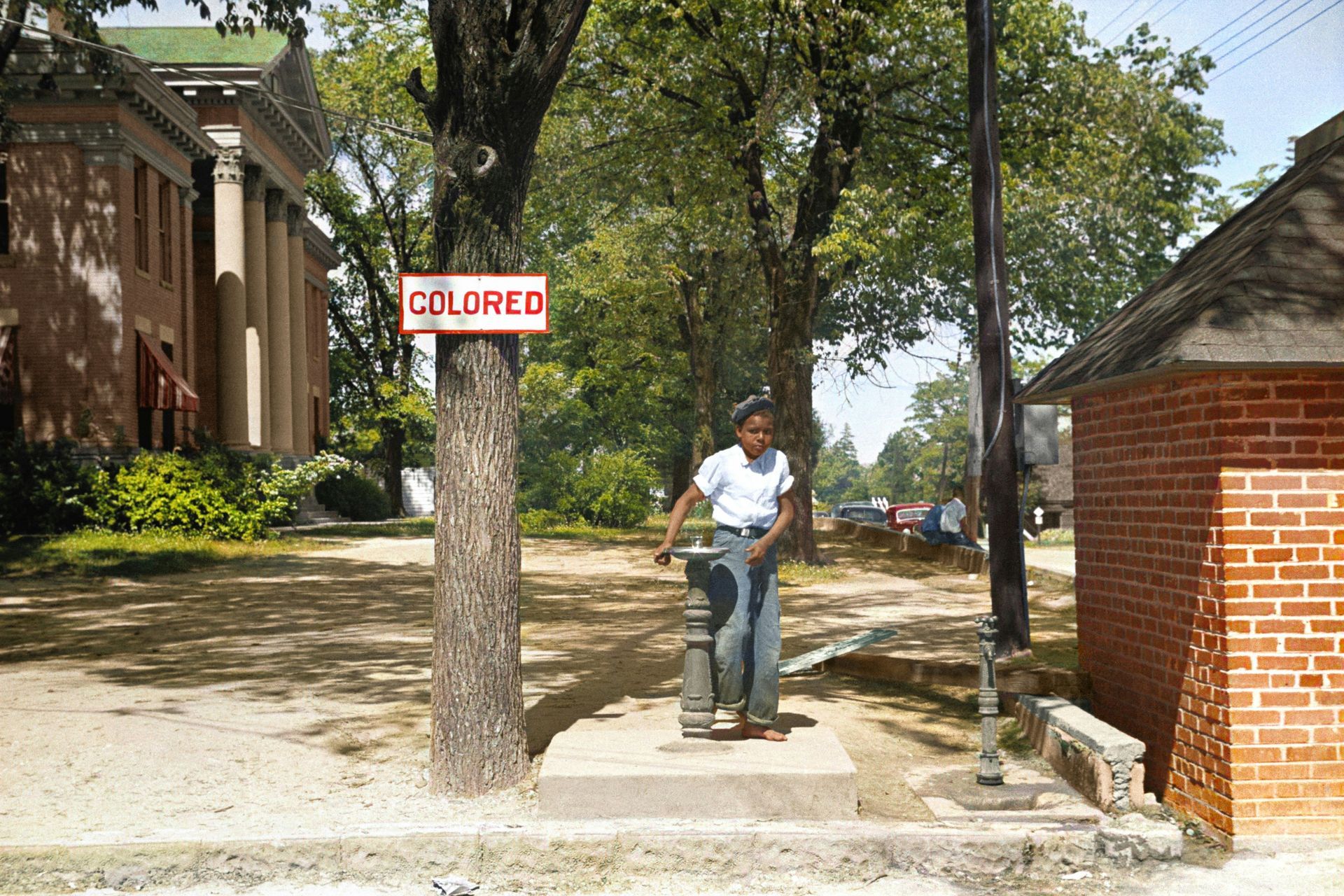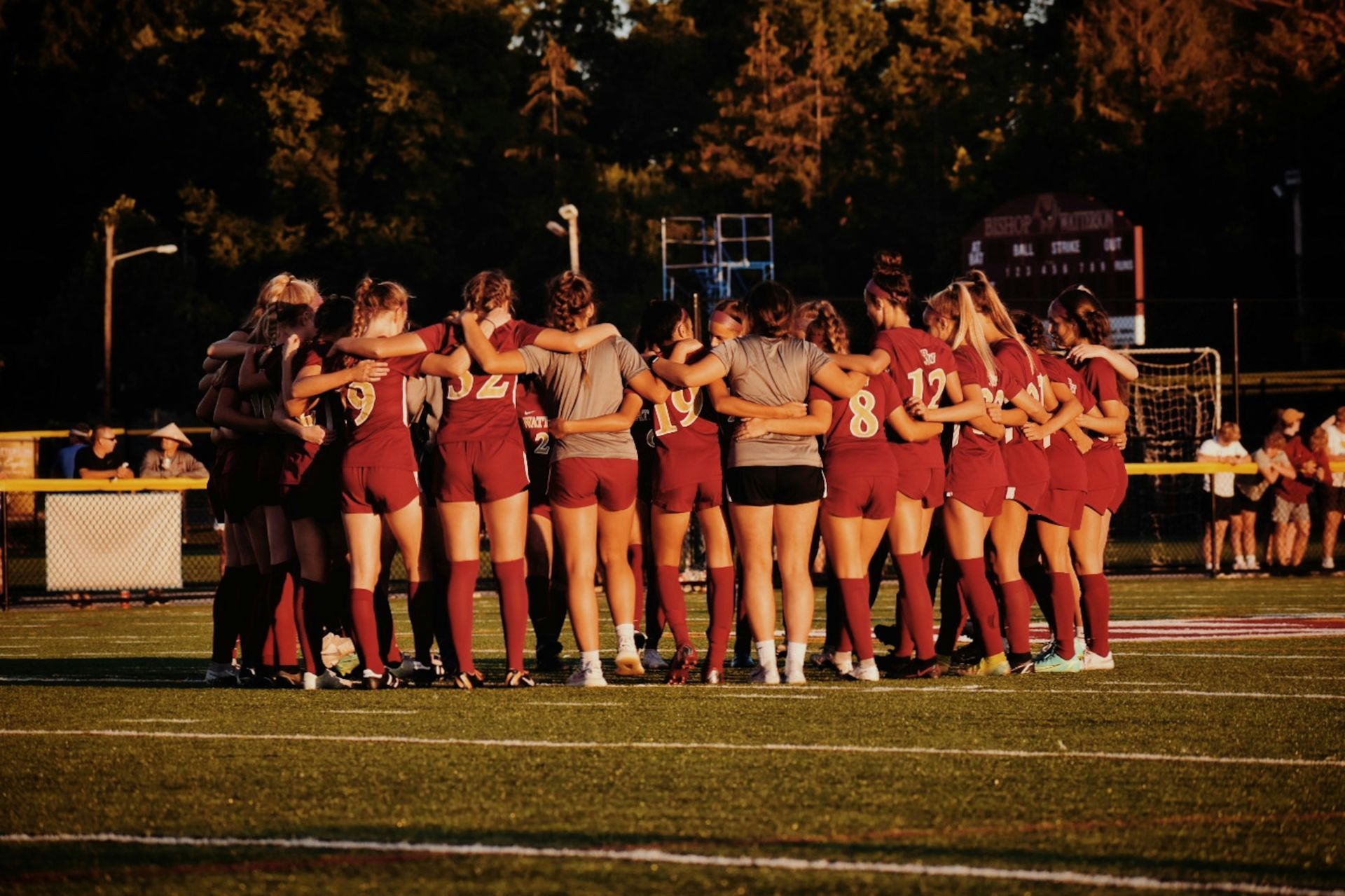Reading Between the Lines of Shared School Board Campaign Messaging
School boards get little attention until there is controversy (Governing), and manufactured controversy is turning Michigan's nonpartisan school board races into heated battlegrounds. Hyper-partisan politics, dark money interests, and misinformation are entering the equation and increasingly influencing campaigns.
When deciphering literature and evaluating candidates, parents and caretakers of current K-12 students have visibility into their districts' real issues. Far more voters are left wondering what to make of shocking claims sweeping the nation and whether local schools have gone as far downhill as anecdotes or literature suggest.
As we dig in, remember what Michigan schools are up against and determine whether a candidate is acting in students' or others' best interests.
Understanding the Role of Local School Boards and How We Got Here
The Michigan Association of School Boards explains that the school board makes policy while the superintendent administers it. School boards offer district leadership through goal setting, policies, superintendent evaluations, budgets, curriculum, staffing appraisals, and determining facility needs. Board members are generally familiar with the district as alumni, former staff, or parents.
School boards don't manage the day-to-day. They can establish policies to guide how districts review content in their media centers, but they are not implementing book-by-book evaluations. They can update district policies to comply with state and federal civil rights laws, but they cannot decide whether to follow those laws, even if their beliefs are at moral odds with them.
Because school board elections and campaigns have not previously required much campaigning, the idea of savvy campaigns and compelling candidate platforms is relatively new. According to the National School Boards Association, turnout in school board elections has dipped as low as 5% to 10%. Michigan’s next round of school board elections will occur during the presidential election, so campaigns are drawing far more attention.
Coordinated Campaigns Aim to “Rebuild” America Through Its Schools
Community schools usually unite residents of all backgrounds through shared pride in students, academics, and athletics. Rivalries generally play out under the Friday night lights.
However, a calculated hyper-partisan blueprint to “rebuild” America through local schools was outlined in the late 90’s. The pandemic and social unrest between 2020-2022 provided the “lighting in a bottle” moment to escalate it.
- Pinpoint schools as assets. A 1996 statement from Faith & Freedom Coalition founder Ralph Reed said, “Winning school elections would win America’s battles over evolution instruction, sex education, and school prayer.”
- Establish the approach. Architects of Project 2025 [and backers of Moms for Liberty] gave a 2002 speech to The Heritage Foundation, explaining that America needs to invest in private religious schools and that vouchers are crucial. Efforts to pass vouchers and eliminate public education once and for all will need to appear locally organized...like it was the idea of moms chatting over coffee.
- Give people an emotional "why." Regurgitating boring messages like "advance academic success" doesn't exactly motivate folks to take action and head to the ballot box. Conservative Think Tank leader and privatization activist Christopher Rufo joined The Heritage Foundation as a fellow in 2020 and outlined in 2021 his plans to manufacture lies to anger and turn out voters, opting to leverage and weaponize misunderstood acronyms like CRT, DEI, SEL, LGBTQ, gender ideology, and more. Not sure what these things mean? That's intentional. Remember when a politician recently said they would make up stories to get people to pay attention? Rufo and his associates fill the knowledge gap with their own stories. Using "BLM's" timeliness, he started with Critical Race Theory, alluding to the concept of "Great Replacement Theory," making white Americans irrelevant.
- Reinforce the mission. Former Donald Trump adviser Steve Bannon amplified the American battlecry message, saying on his podcast, “The path to save the nation is very simple — it’s going to go through the school boards with Critical Race Theory.”
- Enlist, equip and empower the activists. Setting the playbook into motion, heavily funded dark money groups like Moms for Liberty launched to engage moms and parents at the coffee meeting level with opportunities to be leaders in the “fight for the survival of America” as joyful warriors. They launched in Florida, focusing on CRT, and continue to move through the acronyms. Each time Rufo issues a sensational new "brief," Moms for Liberty creates new talking points and action steps to keep people engaged...and angry. We're now onto Parental Rights - another vague term that high courts have helped clarify. Nothing creates an emotional "why" like telling parents they've now become irrelevant and replaced by radical teachers facilitating secret surgeries. Lather, rinse, repeat.
- It's worth noting that all of the bans and don't say legislation started in Florida, where Christopher Rufo was added to the board of New College. The most sensational lies about parental rights and transgender students come from Governor DeSantis, who helped advocate for the latest voucher program in Michigan to help kids escape 'CRT-filled government schools' into private religious schools.
There are several Moms for Liberty chapters and spinoff groups in Michigan.
This plan clearly aims to dismantle public education through fallacies, build a new generation of like-minded voters, and advance favor for private religious groups. Goals for student academic outcomes, post-graduation success, and evidence-based guidance on what’s best for America’s children are not mentioned anywhere. Yet, these groups are enlisting and training today's "Parental Rights" school board candidates and circulating endorsements to signal commitment to their beliefs.
This explains why so many “outside” individuals without school affiliations (besides their geography) are newly stepping up to help "do their part" to see through the plan - whether they know they're a part of it or have been inadvertently swept up in the emotional recruiting and intentionally built community aspect of the joyful warrior fight. Moms for Liberty is skilled at highlighting empowering messaging and downplaying or hiding the rest.
Spotting Plan-Based School Board Campaign Messaging
Savvy school board campaigning and the need to establish platforms beyond committing to “do what’s best for all students” is new. Yet, there is a shared formula that many candidates are using, which points to the local footprint of playbook guidance. The campaign messaging formula looks something like this:
- Highlight 3-4 ubiquitous and generic playbook topics
- Optionally include 1 locally relevant topic, however broad
They're also encouraged to go low.
Examples of seemingly innocent promises with playbook intentions include:
Parental Rights
Parental Rights implies we've lost any control over our children while they're at school. Over the past few years, the country has seen the rise of the “Parental Rights” movement, driven by those who were displeased with the handling of COVID-19.
The fight has put school board meetings into tight — and sometimes dangerous — situations (The Hill). One of the leaders of the movement is Moms for Liberty, which was founded in January 2021 and which co-authored Project 2025 with The Heritage Foundation.
“It has always been parental rights,” a Moms for Liberty co-founder told The Hill. “It’s never just been the toxic critical pedagogy or the masks or the quarantining or the secrets being kept from parents. The overall arching issue is parental rights. Parents have a fundamental right to direct the upbringing of their children. In our government schools, parental rights are being violated every single day. No more.”
Think tanks and dark money groups are using the fearmongering message of parental rights to insinuate that parents are no longer part of their kids’ upbringing or that there are secret things going on inside schools.
Today, Moms for Liberty is going as far as telling parents that their kids are being enticed to take puberty blockers at school and that teachers are referring or driving them to medical procedures to transition. (Tampa Bay Times)
Here's the reality of parental rights, which any parent of public school children will likely agree is what they’re experiencing, with plentiful opportunities to volunteer, attend class parties, engage with staff, and participate in teacher’s conferences. They are also involved in their students’ choices in the media center, and must provide permission for any medication.
Michigan Revised School Code (which is posted in schools and board meetings based on a 2022 law):
- MCL 380.10: "It is the natural, fundamental right of parents and legal guardians to determine and direct the care, teaching, and education of their children. The public schools of this state serve the needs of the pupils by cooperating with the pupil's parents and legal guardians to develop the pupil's intellectual capabilities and vocational skills in a safe and positive environment."
Higher Court interpretation:
- "While parents may have a fundamental right to decide whether to send their child to a public school, they do not have a fundamental right generally to direct how a public school teaches their child. Whether it is the school curriculum, the hours of the school day, school discipline, the timing and content of examinations, the individuals hired to teach at the school, the extracurricular activities offered at the school, or a dress code, these issues of public education are generally 'committed to the control of state and local authorities.'" - Blau v. Fort Thomas Public Schools
Academic Excellence
Who doesn’t want academic excellence? In many cases, school board candidates advocating for “academic excellence” are campaigning in some of Michigan's best-performing districts. Despite the availability of transparent data and recognition of National Merit Scholars, many claims about academic performance are being made based on the candidate’s feelings and ill-formed correlations.
Michigan needs to make progress nationally, but most of this is driven by the need to improve reading and proficiencies by better-supporting students and educators in large metro areas, low-income districts, and underfunded communities.
Consider districts like Forest Hills, Rockford, Byron Center, or Grand Haven, which recently landed on the top 10 list of high performers based on the statewide standardized MSTEP tests. Or the districts that consistently rank on the U.S. News & World Report’s best districts in America. In many cases, these districts are based in the suburban communities where the “coffee conversations” about taking America back are being held.
These candidates try to twist the facts to meet their narratives by pointing to district proficiencies of 68% – 75% in reading and math and position these as test scores that deserve a D or F. In reality, these give schools an A rating according to the MI School Data Dashboard, and top 10 rankings.
Candidates and their PACs make leaps to claim that academic performance is dwindling because of “Marxist” programs like diversity, equity and inclusion, or social emotional learning. Data and studies from the most “academically excellent” institutions like Yale, Harvard and NYU prove otherwise. Even the most conservative colleges like Liberty University, Texas A&M, and Brigham Young educate their students about the benefits of social emotional learning.
If the data doesn’t convince them, and they’re underwhelmed by the teachings of the most elite colleges and universities, then what does “academic excellence” mean?”
- MI School Data
- The Top 50 Districts in Michigan Based on MSTEP Scores (MLive)
- See How Your District Fared in New MSTEP Results (MLive)
- U.S. News & World Report Best High Schools (2024)
- Niche is another local resource to review student and family feedback
Back-to-Basics
Closely related to Academic Excellence is the priority to bringing our schools back to reading, writing, and arithmetic.
We need to shed any “special” or evidence-based programs like social emotional learning (Yale Medicine) which are proven to be one of the most effective tools for identifying high-risk individuals before violent incidents and setting students up for lifetime success.
Again, where do we draw the line on “basics?”Who decides? Experts with evidence or politically influential privatization Think Tanks? Does this mean cutting driver’s ed, or gym, or music class?
Promote the Skilled Trades
This one surprised us, but a deeper look at the rationale explains why it makes the list.
Our skilled trades are facing critical shortages, and most residents will agree that significant post-graduation success can be found in the trades. We should all be promoting paths to skilled trades.
Here's the thing, schools are promoting them with programs like:
- Kent Career Technical Center
- KCTC Manufacturing Hub
- Path to Pro Skilled Trade Nights hosted by school academic booster clubs and local skilled trade businesses
- Ottawa County's Thompson M-Tec
However, the combination of requests for more "Academic Excellence" defined by an intangible demand for "more" and "better" scores and a return to the “Basics” of only reading, writing and arithmetic seem at odds with this platform.
What we've more recently learned is that there is a long history of coaching young conservative students not to attend college, which would help to answer why some candidates aren’t able to articulate what success looks like, or even which colleges they view as a fitting“payoff” for graduating students.
- Young conservatives like me are told to skip college. Don't listen. (USA Today)
- Republican confidence in higher education has dropped the most. Of Americans who lack confidence in higher education, 41% mention colleges being “too liberal,” trying to “indoctrinate” or “brainwash” students, or not allowing students to think for themselves as reasons for their opinions. (Gallup)
- Yes, conservatives should go to college (Christopher Rufo, proud creator of the CRT and gender ideology panic)
Promote the skilled trades as a rewarding career with significant earning potential: yes. Target students who fit a future voter profile: no.
Fiscal Responsibility
Our public schools are responsible, by law, for outlining their budgets, discussing and approving line items during monthly board of education meetings, and participating in annual audits.
All of this information is required to be posted online, and public meetings about school budgets are open to the public.
- MI School Data Financial Transparency Dashboard
- MI School Data Budget Transparency
- Department of Education
- Check your school district's reporting
What's more troublesome is that trends show Parental Rights candidates are advocating against bonds and millages that schools are required to fund through ballot approvals. Millages use non-homestead taxes to support operations. Bonds fund buildings, including repairs and construction. Schools cannot borrow or shift money between three legally defined budget categories. We simply can't not pay for new football field turf in order to pay teachers more.
Here is a short three-part video series that explains how Michigan schools are funded. After watching these videos, you will see how it's also unfair and unrealistic to demand that Michigan schools "spend what they have and not go into debt with bonds." Unfortunately, that's not how Michigan laws are structured for school spending.
Failure to pass bonds and millages requires schools to take money from their per-pupil education budgets to cover things like roof repairs or tires for school buses. Sitting and campaigning school board members are running on platforms that tell voters to elect them to "stop the waste." What they aren't telling you is that this will dramatically affect their goals to support "Academic Excellence."
Similarly, Parental Rights candidates have made efforts to recommend cutting mental health professionals, programs like SEL that mitigate bullying, and even safety tools and technologies to enable first responders to connect more quickly with school districts during violent incidents.
There’s a difference between fiscal responsibility and revenge cuts to spite public education.
School Safety
Here's another platform that sounds relatable to most community members.
Mitigating and preventing the threat of violence is on most peoples’ minds. Many of our districts are fortunate to have School Resource Officers and expert counsel to help identify available tools and technologies. Michigan students are also encouraged to use Ok2Say.
Notably, these board members and candidates are looking to cut the programs proven to help prevent violence, and they have delayed or voted down tools and technologies to assist schools through threats.
More recently, manufactured uproar over Title IX changes and a legacy of vilifying LGBTQ students makes the School Safety priority more about protecting girls from transgender people.
Enrollment
Some candidates in high-performing districts claim that school enrollment is dropping because their districts are failing students and families are turning their backs on things like SEL or CRT or indoctrination.
Schools don't conduct entry or exit surveys to know how or why students make changes. A mix of inquiries, data, and anecdotes will give voters a best guess.
One of the most accurate ways to assess each district’s landscape is to review the data on the schools of choice chart, which shows how many available students reside within the district’s boundaries. Has the number of school-aged students dropped from 10 years ago? If so, this could be due to factors like shrinking birth rates, housing prices in desirable school districts, and slowing turnover that creates space for new families to begin their education journey.
- Schools of Choice (Bridge Michigan)
As for reasons students depart any school, there could be any number of factors, including:
- Unresolved bullying
- Athletic programs (including reclassifying, stronger programs, or coaching)
- Moving
- Access to stronger special education programs
- Language immersion programs
- A desire for private religious education
- Frustration over masks during COVID-19 (which drove some students out, but also brought some back)
- A desire to begin school in a district that offers pre-K or early childhood programs
Transparency
This is another vague term, and we could give it a pass because so many different candidates use it.
Ask the candidate what they mean when they promote transparency. Is it that they want their opinion to be the final say in whether a vote, policy or decision is made? That is not transparency so much as it is an ask for control.
Are they asking for a tangible solution, like streamed or recorded school board meetings?
Remember:
- Financial reporting is posted under website sections labeled “Transparency.”
- The public attends and participates in meetings based on the Open Meetings Act.
- Every person is able to have their voice heard by speaking at public meetings or communicating their input through email and phone calls. Feedback or input doesn't always mean action, but anyone can provide it.
- Parents are encouraged to maintain direct communication with educators and principals and attend parent-teacher conferences.
It appears that people just want to know how and why decisions are being made, and if anything is influencing policies or votes. This dialogue occurs during monthly meetings, public comments, and in emails or calls to board members.
Inappropriate Content
Like the ubiquity of parental rights, books are one of the only "universal" tools that privatization groups like Moms for Liberty can use to point to the American public education system as "failing."
After the COVID-19 pandemic and mask anger subsided, the group pivoted to books. They claim school libraries are full of pornography and students are randomly stumbling upon rare and limited titles. This usually occurs after the parent has combed through the media center library to determine whether the school has the book on file.
Some parents have attempted to sue their districts over book content.
Despite the Supreme Court defining obscenity through the Miller Test, schools implementing policies that give parents various ways to restrict materials, and storing some books behind shelves, the goal posts keep moving from restrictions and accomodations for their students to requests to re-catalogue the entire library to their subjective rating system.
Claims that books can stay in public libraries proves false, as evidenced by elections for the Patmos Library in Jamestown and the Algoma Library. (Barnes and Noble is on boycot lists.)
- One Kent County parent attempted to call the Kent County Sheriff's Office to arrest the school librarian.
- A Milan mother brought and read an issue of Penthouse Magazine to a school board meeting.
- Another parent tried to file a lawsuit with the Kent County Prosecuting Attorney, who informed her there is no "there there."
- Community members and folks claiming to be grandparents have attempted to request formal reviews of book content, despite having no children in a respective school.
Moms for Liberty continues to fuel the fight with expanding tools and resources:
- Their own subjective rating system
- A website of book ratings called Book Looks
- Facebook groups called Mary in the Library or Laverna in the Library that encourage people to go find specific books and share screen shots
- A 90-page guide to the list of books people should request their school boards to ban
What Strong Candidates Say
Teachers and school board members are not savvy campaigners, coached by think tanks and playbooks, or funded to buy more than a handful of signs, let alone billboards or mailers. It's rare to see objective candidates reference their political party in any of their campaign materials or conversations.
Campaign and school board priorities mirror some of the Real Issues.
- Increasing the voices of educators during administrative decision-making
- Promoting healthy class sizes
- Support from paraprofessionals and other staff to assist educators with managing student behavior
- Increasing resources and support for student (and educator) mental health
- Supporting special education students and programming
- Mitigating issues like vaping, attendance, and bullying
- Shaping and contributing to the district's strategic vision
- Advocating for practical solutions to enrollment, such as adding early education and pre-K programs
- Clarifying expectations between educators, instructional coaches, and administrators
- Leveraging available resources for tutoring programs and solutions to promote reading proficiency
- Developing engaging lessons that maintain and increase student participation and enthusiasm
- Ensuring equity across school buildings and program offerings
- Promoting objective, data-backed, and evidence-based decision-making
- Increasing compensation for educators, substitute teachers, paraprofessionals, and transportation staff
- Improving the nutrition and quality of foodservice offerings
- Advocating for ample funding and helping the district build community understanding and support for bonds and millages
Will Parental Rights Prevail in Michigan? Election 2024 Will Soon Tell
Election outcomes across the country have begun to show diminishing returns for parental rights candidates:
- "Too hyperbolic? School board parental rights push falters." (AP)
- Analysis: Parents rights school board campaigns lost most Michigan races (Bridge Michigan)
History shows that these privatization groups are always searching for the next big emotional hit, so the efforts of "Joyful Warriors" will surely evolve. However, the more likely long-term scenario and success factor for advancing universal vouchers, privatized education models, and various bans is through the much friendlier Supreme Court.




